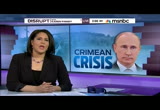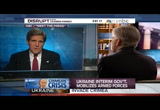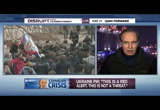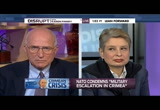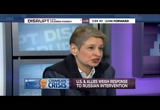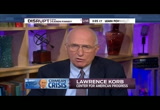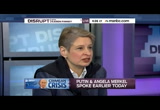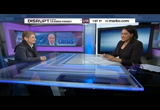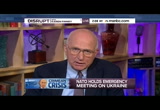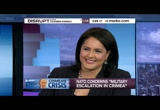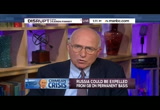tv Disrupt With Karen Finney MSNBC March 2, 2014 1:00pm-2:01pm PST
1:00 pm
and medications, especially insulin, corticosteroids, or medicines to decrease blood clotting. in a clinical study, over 80% of treated men had their t levels restored to normal. talk to your doctor about all your symptoms. get the blood tests. change your number. turn it up. androgel 1.62%. hello, disrupters. i'm karen finney. in your sunday forecast, a showdown between presidents obama and putin intensifies over the crisis in the ukraine. and from here, it is beginning to look personal. >> russian forces take crimea. parliament authorizes a strike on ukraine. >> ukraine retaliates and puts its own armed forces on full combat alert. >> secretary of state john kerry calls it an invasion. >> in the southern port, his army is already in direct conflict with a unit of ukrainian border force. >> president obama spent a tense 90 minutes on the phone with
1:01 pm
president putin. >> all options are on the table. >> this is a conversation about obama's leadership, pure and simple. >> i think this is an enormous mistake for russia. >> you don't want to provoke putin, but you do want to be strong. >> russia is going to lose. the russian people are going to lose. >> that sochi charm offensive died on the streets. >> the last thing anybody wants is a military option in this kind of a situation. >> i think you're going to find a house that's very cooperative with the administration on this one. >> there are some moves they could make and could make right now. >> i would like to create a democratic noose around putin. >> are you willing to go to ukraine and show solidarity with the ukrainians if russia doesn't back down? >> absolutely. we've got red alert in e ukraine and all eyes are on president obama to find a way out of the crisis.
1:02 pm
ukraine's armed forces now stand at the ready in case of any further aggression by russian troops, who continue to tighten their grip on the crimean peninsula. today, a tense stand-off, demanding soldiers there turn over their weapons. there's no sign of either side backing down from the brink. nato held an emergency meeting today as the u.s. and our allies formulate a response. here's john kerry on "meet the press" this morning. >> i think there's a unified view by all of the foreign ministers i talked to yesterday that they're simply going to isolate rush, that they're not going to engage with russia in a normal, business-as-usual manner. that russia is inviting aproep rum on the international stage. you just don't invade another country on phoney pretexts in order to assert your interests. >> but even if the international community could make russia a
1:03 pm
pariah, would vladimir putin bat an eyelash? joining me from moscow, nbc's jim maceda. jim, how is putin reacting to this criticism? >> reporter: hi there. well, karen, first of all, putin wouldn't call what he's doing an act of war or aggression, with all due respect to secretary of state kerry. as putin told german chancellor angela merkel in a phone call this evening, he believes mos w moscow's actions are appropriate, and they're more about self-defense. from his point of view, the new pro-western government in kiev poses a threat to his interest in ukraine. that's primarily crimea, where today there were even more troops roaming around going from ukraine army or military post to post, as you mentioned in your lead, trying to disarm the ukrainians. when they wouldn't agree to that, surrounding them and neutralizing their bases.
1:04 pm
but crimea gives putin the essentials he wants and needs. a base for his black sea fleet. he just doesn't seem affected by all the criticism coming from abroad. putin doesn't seem to believe that the u.s. or its allies have the kind of leverage to hurt him, especially when he sees the reaction from russians in a place like here, moscow. in the streets of moscow today, there were literally tens of thousands of demonstrators in support of putin's actions in ukraine with more pro-putin demonstrations expected in the days ahead. so putin, despite all the criticism, has really struck a cord here at home, karen. >> all right. thank you very much, jim maceda, in moscow. let's bring in the former assistant secretary of defense under president reagan.
1:05 pm
thanks to you both for joining me. i want to talk about this idea of what options really are available. this morning there was a lot of conversation on the various sunday talk shows about things like boycotting the g-8 summit in sochi, potentially the expulsion of russia from the g-8, economic sanctions, suspension of trade talks, asset freezes, visa bans. in your mind, what would be the strongest leverage point out of those options? >> i think all these options are very good. they're all possible. suspension of g-8 or kicking out russia of g-8 and turning it back into g-7 would be very, very strong message and very appropriate message because, of course, russia got into g-8 out of pity when the soviet union collapsed, so it really had no business to be there to start with. so here we are back to the reality. there are other options. russia is big on sending its gas
1:06 pm
to europe. there's a south stream pipeline being constructed and put forward. so maybe a blocking of that project can also bring some positive results. but the problem is, if putin decides he's going to take over crimea, he's going to take over no matter what. >> right. lawrence, that's really the question that i have in following all of this. it strikes me, all these different things that have been talked about. putin's leverage -- i think his strongest leverage is he knows no one wants to go to war. none of these countries would have the support from back home or sending troops abroad, for heaven's sakes, to deal with this. so if he wants crimea, he's going to get it. >> there's no doubt about it. remember, this is not the cold war, where it's a zero-sum game. in fact, he already has the crimea for all practical purposes. they've got the black sea fleet there. so we don't lose. but i agree with nina.
1:07 pm
you ought to put these sanctions on them, dry up the assets of some of the oligarchs, make it difficult for them to use the worldwide banking system. he'll pay a price. but essentially in the yen, remember, in 2008, president bush tried the same thing over in georgia. you know, putin has two of the provinces of georgia that are part of russia. >> nina, one of the other ideas we've heard is to do more to bolster ukraine and the ukrainian government, whether it's economic aid. i think they've asked nato to get involved diplomatically. how does that help balance the equation, if at all? >> i think it does. the ukrainian government now has no capacity to go to war or just even on an every day basis fight the russian troops in crimea or defend other ukrainian cities against the possible russian invasion. i'm going to put invasion in
1:08 pm
quotes. but yes, however, i think the stronger the west is unified in its policies, saying not just visas against the oligarchs or frozen assets, but let's go for all russian citizens. i know it sounds drastic, but when russians are devoid of the ability to travel abroad and have access to their moneys stashed in british banks, that would become a very different russian environment. now they're walking in the streets happy and screaming. you know, ukraine is russia, or crimea is russia. i would like to see russia completely closed. it is not the cold war, but if the borders are closed for other reasons, how popular will putin become with grandiose strategies. >> certainly once you start messing with people's money, they take it very personally. lawrence, a question i had about this is, you know, there are other actors on the world stage who are like in syria, like karzai, who's been particularly
1:09 pm
difficult. how does the way that president obama handles this situation impact, you know -- iran is another one. what are these world leaders looking for? >> well, i think all of these are interrelated. while we want to penalize putin for doing this, you need his help both in syria and eastern. without the russians putting the sanctions on iran, we would not be at the negotiating table. i think you have to keep these things in mind. your other guests would know this. the soviets cracked down on hungary and poland when they tried to assert their independence. then president eisenhower invited her granddaughter over. why? because we needed to deal with them. yes, we can penalize putin. i think you're right to make it difficult for the russians to get access to the world banking system. those would all be important
1:10 pm
things. in the final analysis, you have to deal with them because russia is not as powerful as it once was, but it's still a significant actor in the world stage. >> so nina, i want to talk to you about something you've written about, which is this idea that putin is sort of pursuing an outdated image of greatness. secretary of state john kerry said that in a slightly different way this morning. let's take a listen. >> it's really 19th century behavior in the 21st century. it's a 19th century act in the 21st century. you just don't in the 21st century behave in 19th century fashion by invading another country on completely trumped up pretexts. >> okay. so a real contrast there. 21st century, 19th century. >> 19th century is good, but i would go for the 20th.
1:11 pm
i would kind of go that far back. it certainly is -- putin certainly is -- in some ways putin is using that playbook. he does use this playbook. i think the problem with this -- it was an entirely different balance of power and all these paradigms of geopolitics were very different. imagine that 60 years from now we are still using this same paradigm of greatness, the same playbook. that is where the danger is. we haven't evolved. that is really a big, big problem for the world and russia in the long run. >> you know, lawrence, final question to you. to this point, i was working for president clinton at the time when it was the g-7. then it was the g-8.
1:12 pm
but he and boris yel sin had a personal relationship that made a lot of what happened possible, i guess. i'm thinking a lot of vodka drinking, but a lot of -- you know, at the summits you could tell there was a personal rapport. putin is not that kind of guy, for starters. we don't see that kind of relationship with president obama. so to this idea of these outdated modes, i mean, it strikes me that putin doesn't necessarily share those values or those interests of being a part of the g-8 or -- and again does hold on to this 19th century, 20th century model of what he's trying to accomplish. >> well, remember, president bush thought he could get along with him. he said, i looked into his soul and saw somebody i could deal with. you're quite right. he doesn't care. but i think the important thing is this will not be a long-benefit for him and the russian people. because if we do the things that nina was talking about here in terms of making it difficult for the russians to have access to
1:13 pm
the world economic system and trade and all that, they are declining power. their population is declining. so in the long run, this will be, you know, worse for russia. putin is -- in the short term, he may get some gains. in the long term, this is going to hurt him and the russian people. >> clearly we're going to be following this, this week. this will be something president obama will have to deal with. thank you, larry and nina. >> thank you. up next, president obama's new program, my brother's keeper. how will it make a difference in the lives of young men of color? >> i didn't have a dad in the house. and i was angry about it, even though i didn't necessarily realize it at the time. i made bad choices. i got high without always thinking about the harm that could do. with at&t's new pricing for families you get 4 lines on at&t's network... including unlimited talk
1:14 pm
unlimited text ...and 10 gigs of data to share. 10 gigs? 10 gigs. all for $160 dollars a month. you know, i think our family really needed this. it's really gonna bring us closer together. yep. yep. yep. yep. yep. yep. introducing our best-ever family pricing for instance, a family of four gets 10 gigs of data with unlimited talk and text for 160 dollars a month. only from at&t. humans -- we are beautifully imperfect creatures, living in an imperfect world. that's why liberty mutual insurance has your back, offering exclusive products like optional better car replacement, where, if your car is totaled, we give you the money to buy one a model year newer. call... and ask an insurance expert about all our benefits today, like our 24/7 support and service,
1:15 pm
because at liberty mutual insurance, we believe our customers do their best out there in the world, so we do everything we can to be there for them when they need us. plus, you could save hundreds when you switch -- up to $423. call... today. liberty mutual insurance. responsibility. what's your policy? good and close. help keep teeth clean and breath fresh. with beneful healthy smile food and snacks. he'll love the crunch of the healthy smile kibbles. you'll love how they help clean. with soft, meaty centers, and teeth cleaning texture, healthy smile snacks help keep a shine on his smile. it's dental that tastes so good. beneful healthy smile food and snacks.
1:17 pm
we saw very personal side of president obama earlier this week when he announced a new initiative aimed at addressing the unique obstacles to success that young black and brown men face. as the president pointed out, young men and women of color are systemically and structurally blocked from the tools, the resources, and opportunities to make good choices for their lives and succeed. now, the statistics are staggering. two-thirds of students who can't read proficiently by the end of third grade will end up in jail or welfare. more than 70% of america's inmates can't read above a fourth grade level. nearly 85% of juvenile niles in the court system are functionally illiterate.
1:18 pm
the correlation could not be clearer. the president's initiative called my brother's keeper includes business leaders, government, faith, and community leaders and a $200 million pledge from philanthropic organizations who will work over the next five years to identify effective programs and models that address issues ranges from early childhood development to education, parenting, and economic challenges. the goal is then to replicate those programs across the country. some critics are saying it doesn't go far enough or do nearly enough. others are criticizing the president for not doing more earlier in his presidency. what struck me is perhaps the most important thing president obama did was to publicly challenge the idea that the status quo for young men of color is unacceptable. >> we just assume this is an inevitable part of american life. instead of the outrage that it is. it's like a cultural backdrop for us in movies and television. we just assume, of course it's going to be like that. >> here to talk more about the
1:19 pm
president's initiative and the issues faced by communities of color are the president of moorehouse college, dr. john wilson, the president of spellman college, dr. beverly tatum. hello, my distinguished panel. so i want to start with you and get your reaction to the president's announcement. >> well, i thought it was a great announcement. the president was correct in saying that something ought to be down about it and needs to be taken more seriously. i believe that morehouse college has been doing something about this issue for a very long time. he is know focused on minority males, african-american males in particular, and by involving the private philanthropic community, i think it's going to be a win-win. the $200 million, by the way, is just a start. >> dr. tatum, your thoughts?
1:20 pm
>> well, i also would agree that it's great that president obama is using himself as a role model and as an example to inspire the nation to pay attention to the plight of young black men. it is important, however, to point out that young black women are not doing much better. the gap between black girls' dropout rate and the brdropout rate for black men is only a 10% difference. i think we have to continue to think about this in a comprehensive way, thinking about how we are addressing the needs of young people of color across the board, men and women. >> you know, joe, one of the things that struck me was that the president was speaking i think very specifically to a certain demographic of young brown and black boys. but as pointed out, neither jordan davis or trayvon martin were low income and both had active fathers. as much as we talk about, you know, some of the things that are in the president's proposal, one of the things i didn't hear
1:21 pm
this time from the president, i should say, because he's talked about it before, is the idea of confronting and addressing our biases and other factors that create this toxic and dangerous environment for young boys of color. >> i think in a way he did address it in that last clip you had. he said, you know, we have -- and these are my words -- low expectations. it's become the norm. we see it in our culture. we see it in our music. we see it in the movies. it becomes the norm, and it can't become the norm. as i look at the two distinguished distinguish ed of two of the most distinguished universities in america, i think about when i was growing up. it was morehouse men, spelman women that taught high school. in fact, that taught us, that challenged me to be more. because they had higher expectations. i think one of the most comprehensive things we can
1:22 pm
do -- and i say that because of the two guests you have -- is that we have to recognize in our community that education -- and look at the two graphics you had earlier. education is the new currency of the 21st century. >> absolutely. >> it's not going to be black or white, republican or democrat, poor, rich. it's really going to be those who have education and trade and those who don't have education. and i think we have to have an educated community. >> and dr. wilson, to that point, i wanted to ask you, what are you seeing? we hear statistics all the time about young men and women, frankly, starting college, not prepared for college. i'm wondering what you're seeing at morehouse with the students that you have coming in. >> oh, i don't think it's unique to morehouse. i think we see the lag nationwide. african-american males in particular start with smaller vocabularies at kindergarten
1:23 pm
entry. 86% of them -- and this was a big stat in the president's announcement -- 86% of african-american males are reading below proficiency levels by the time they enter fourth grade. they're at the highest risk of low academic performance. so then it's no surprise that one in three african-american males today can expect to go to prison in their lifetime. >> right. >> that is shocking. okay? and we can do something about that. >> you know, dr. tatum, one of the things you and i have talked about before are sort of the historical, systemic causes that impact the opportunities kids have today. i want to read something that was written in the daily beast. he sads, after all, that's how we got here. if these young men are coming from neighborhoods that are poor, segregated and violent, it's because for most of the 20th century, it was the policy of the united states to make them that way. for half a century, we siphoned wealth from black families. we denied them loans, closed them off in housing projects,
1:24 pm
red lined their neighborhoods, and left them to fester. if they saw any investment, it was in police, not to help the residents but to keep them in their place. i wanted to get your reaction. >> i think it's an accurate statement. i think it is an accurate statement when we look at the policies just as were outlined, whether it was red lining or disinvestment in public education in neighborhoods dominated by black and brown youth, whether it is -- even today the investment we're not making in the young people who are ready for college. i know that one of my major concerns, and i know dr. wilson shares this, is that we have kids who have done everything they're supposed to do. they come to school, ready to be successful in college, and yet have to drop out because they don't have access to the funds they need. so there's a real challenge. and i think that's a particularly important point. i just want to say this. in the context of the president's new initiative, because when you have the young people who have been successful
1:25 pm
and who have made it to college, but then come home in defeat and debt because they haven't been able to complete their degrees, they then become a model of disincentive for their younger brothers and sisters who see, you know, my big brother, my big sister tried and was not successful in being able to complete. so even as we look at ways to intervene in a much earlier stage for kids to make sure they are on the right track and having the support and mentoring they need, we also need to invest in those student wos are in college today trying to complete their educations and will return to those communities as role models if they can be successful. >> you know, joe, final question to you. not surprising, the president is getting criticism from the left and the right. you know, obviously on the left some are saying it's too little, too late, he should have done it early. some acknowledged this is an important first step, but not nearly enough. on the right, there's the criticism this is nothing but, you know, government sponsored
1:26 pm
discrimination. we saw that in a piece in "the national review." but there's nothing the president could do on this issue that's more important than speak out on it that's going to satisfy anybody. >> roger craig doesn't live in my neighborhood. i just discount that. but let me first point out something. people on the left think it's all public policy. people on the right think it's all personal responsibility. it's both. if you have public policy to build a school, then you have personal responsibility to make sure those children go to school to learn. it's a combination of both. i think the president talked about that. but the reality is that we have to understand that this is about the salvation of our demographics. as far as it's too little too late, look, i don't care when you come to the party as long as you come there ready to do what has to be done. and before people start criticizing what the president
1:27 pm
did, hasn't done, when he did it, when he didn't do it, look yourself in the mirror and ask, what are you doing? what are you going to do about it? >> absolutely. that is a great place to leave this. i wish we had more time, but we will come back to this subject. thank you so much for your time. >> thank you. >> thank you. >> thank you. coming up, a scary and very true story of how american children are being endangered in the juvenile justice system. and later this hour, what's old is new as thousands of documents from the clinton white house released this week. i'll speak with two authors of the new details to hillary clinton's post-white house life. k you'll need when you retire? then we gave each person a ribbon to show how many years that amount might last. i was trying to, like, pull it a little further. [ woman ] got me to 70 years old. i'm going to have to rethink this thing. it's hard to imagine how much we'll need for a retirement that could last 30 years or more. so maybe we need to approach things differently, if we want to be ready for a longer retirement.
1:28 pm
♪ cut! [bell rings] this...is jane. her long day on set starts with shoulder pain... ...and a choice take 6 tylenol in a day which is 2 aleve for... ...all day relief. hmm. [bell ring] "roll sound!" "action!" itit grows more sophisticated baevery day. back alleys. if it were a business, it would be a fortune 500 company. fraud has evolved. american express intelligent security gives you tools to fight fraud and a global service network that never stops working. so you can be a member of a more secure world. this is what membership is. this is what membership does. my dad has aor afib.brillation, he has the most common kind... ...it's not caused by a heart valve problem. dad, it says your afib puts you
1:29 pm
at 5 times greater risk of a stroke. that's why i take my warfarin every day. but it looks like maybe we should ask your doctor about pradaxa. in a clinical trial, pradaxa® (dabigatran etexilate mesylate)... ...was proven superior to warfarin at reducing the risk of stroke. and unlike warfarin, with no regular blood tests or dietary restrictions. hey thanks for calling my doctor. sure. pradaxa is not for people with artificial heart valves. don't stop taking pradaxa without talking to your doctor. stopping increases your risk of stroke. ask your doctor if you need to stop pradaxa before surgery or a medical or dental procedure. pradaxa can cause serious, sometimes fatal, bleeding. don't take pradaxa if you have abnormal bleeding or have had a heart valve replaced. seek immediate medical care for unexpected signs of bleeding, like unusual bruising. pradaxa may increase your bleeding risk if you're 75 or older, have a bleeding condition or stomach ulcer, take aspirin, nsaids, or blood thinners... ...or if you have kidney problems, especially if you take certain medicines. tell your doctors about all medicines you take. pradaxa side effects include indigestion, stomach pain, upset, or burning. if you or someone you love has afib
1:30 pm
not caused by a heart valve problem... ...ask your doctor about reducing the risk of stroke with pradaxa. coming up, they went from being the fiercest of rivals to being pals. we'll examine the relationship between president obama and secretary of state hillary clinton. plus, a shocking kids for cash prison scandal that puts a spotlight on a problem that communities around the country are actually facing.
1:31 pm
let me talk to you about retirement. a 401(k) is the most sound way to go. let's talk asset allocation. sure. you seem knowledgeable, professional. would you trust me as your financial advisor? i would. i would indeed. well, let's be clear here. i'm actually a dj. [ dance music plays ] [laughs] no way! i have no financial experience at all. that really is you? if they're not a cfp pro, you just don't know. find a certified financial planner professional who's thoroughly vetted at letsmakeaplan.org.
1:34 pm
two judges in pennsylvania pleaded guilty today to taking huge payoffs to send teenagers to privately run detention centers. >> the former judges arrived at the federal courthouse. >> prosecutors accuse them of sending juveniles to a privately run detention center. >> the evidence against the former judges was compiled by the federal bureau of investigation. >> in a scandal known as kids for cash -- >> a kids for cash scheme. >> judges are getting pay back from the private sector. >> $2.6 million in kick backs. >> that was the opening scene of a powerful new film "kids for cash," which tells the story of a case that made national headlines in 2009. two pennsylvania judges accused of receiving $2.6 million in kick backs between 2003 and 2007 from the contractor and builder
1:35 pm
of two private juvenile detention centers. now, by the time the judges were caught, their juvenile incarceration rate was more than double the rate of the entire state of pennsylvania. both judges have been convicted and serving time. the film chronicles the experiences of six of the thousands of children and families who were impacted by the harsh sentences doled out by the foreman pennsylvania judges. many of the children were given overly harsh sentences, some spending years in detention centers that were more like adult prisons. it's but one community where zero tolerance policies and biases have led to increasing numbers of children being funneled into the juvenile and criminal justice systems. joining me now to discuss the film "kids for cash," is the film's producer and director, robert may. thanks to you both for joining me. >> thank you.
1:36 pm
>> thank you. >> robert, i want to start with you and talk about the film. i know it was very personal for you. you live in the county. so you saw this as it was happening. >> i did. my producing partner and i were actually working on a fiction film about greed and kids and power when the headlines hit january 2009. it's truly a case of truth is stranger than fiction. >> and one of the things that struck me in the film is that the judge really tries to maintain throughout the film that, you know, this sort of nothing is here. just because i have the money and these kids got these overly harsh sentences, you shouldn't draw any conclusion from that. >> in 1995 he ran on a platform of being tough on kids, zero tolerance. he was elected in '96. that was three years before columbine. before columbine, you thought he was a man before his time and came into his time during columbine. he didn't necessarily see the correlation between the money and actually the way he was treating kids. >> interesting.
1:37 pm
you know, one of the things that i found very striking in the film were the number of families, and it sounds like additional children, who had no idea of their rights and didn't have lawyers. we have a little sound i want to play and talk about that a little bit. >> sure. >> a woman slid a paper, a form, but it was blank. she said, do you have an attorney? i said, no. she said, sign here. okay. so i sign here. we were briskly brought into the courtroom. the judge leaned across the table and yelled, what makes you think you can do this kind of crap? i had my hand on hillary's shoulder, so i could feel her backing up. i just whispered in her ear, it's okay. >> things went very quick in the courtroom. about 60 seconds. while i was being handcuffed, i could hear my mother wailing right next to me. the woman who was cuffing me goes, look what you did to your mother. i was just, like -- i was
1:38 pm
completely confused. >> what flashed into my head is they just took my daughter away from me. she now -- legal and physical custody is no longer mine, and they're going to take her away. that's what that means. >> that's a sentiment we heard quite a few times in the film. again, this idea that these were parents who didn't necessarily know their rights. they didn't realize that there were lawyers standing right there in the courtroom. we're going to talk about this problem more nationally because i think there's a correlation. it seems is like they were easy prey because they didn't know their rights. >> well, i think frankly they also thought that their kids weren't doing anything that serious in the first place. the fact is more kids are arrested for nonviolent offenses than any other kind. they figured, well, it wouldn't be a big deal. they were more naive. also, you know, not having a lawyer doesn't make sense whether you're an adult or kid. >> of course. >> i think it's just a matter of the kinds of crimes they thought it was.
1:39 pm
they were much more naive. i think a lot of people are naive about it. >> you know, athena, this is obviously one community, but there is a much broader issue happening in our country. the school to prison pipeline, which i know you talk about. and it's interesting because in the film they talk a lot about this sort of post-columbine frenzy almost in terms of the need for these zero-tolerance policies. one of the things that we know, that you all have pointed out, is these policies -- it's not just that they're overly harsh, but they disproportionately impact children of color, lgbt students and children with disabilities. talk about that. >> that's absolutely right. zero-tolerance policies disproportionately impact black and brown youth. what we're seeing nationally is there's a knee-jerk reaction to minor misbehavior in the classroom. there's also an implicit bias that's taking place when we look at behavior. so threatening behavior,
1:40 pm
classifications such as disruption, all of these terms are highly racialized, and they're impacting black and brown youth substantially. >> and you know, robert, this is a problem we're talking about, and you talk about in the film the broader statistics. i thought it was important to bring in the point that predominantly we're talking about black and brown children. you made a comment that someone had commented to you that actually they thought perhaps the fact the film focuses on a white community and white set of subjects might make more people go and see it. >> well, the first time i heard it was as we were making the film and finishing. it was a startling comment because, you know, we're following these kids. we're not looking at their color. we're following what's happening to these kids. i realize how naive i was, really, and almost every screening we've done, that's been pointed out. someone of color will say, you know, thank god these kids are white, otherwise no one would be paying attention. it's really a sad state of
1:41 pm
affairs when people say that because it's absolutely true that there are more kids of color that are locked up. especially in a city like d.c., where it's almost exclusively that way. we should be worried about all children. >> of course. and you know, athena, final question to you. we wanted to highlight the population of children that this impacts, but i don't want to lose sight of the fact that we're talking about putting children in private juvenile facilities, essentially. those are facilities where you have a company running those facilities that have a bottom line, and their bottom line is not necessarily rehabilitating children. i think we saw that frankly -- you see that in the film just in terms of the experiences these kids have. we've seen in many, many stories across the country where time and time again greed outweighs the needs of the children. >> absolutely. it's so uncredibly disturbing that we have quotas based on bodies. you know, we're looking at this
1:42 pm
profit incentive when it comes to locking up kids. juvenile system was intended to be rehabilitative in nature. but what we've done is we've incentivized placing youth in prisons. i think the film does a brilliant job of demonstrating that, showing the problem with that and also linking together the issue of zero tolerance. >> it is a great film. robert, how can people get involved or learn more about it? where do they go? >> they can go to kidsforcashthemovie.com. opened in new york this weekend. opens in los angeles and washington, d.c., next friday. >> all right. keep an eye out for it. it's a great film. thank you. >> thank you. up next, our disrupter of the week. a woman who told the truth and told off her leading man. we have a personalized legal solution that's right for you. with easy step-by-step guidance, we're here to help you turn your dream into a reality. start your business today with legalzoom.
1:43 pm
we're here to help you turn your dream into a reality. you get 4 lines onw at&t's network...ilies including unlimited talk unlimited text ...and 10 gigs of data to share. 10 gigs? 10 gigs. all for $160 dollars a month. you know, i think our family really needed this. it's really gonna bring us closer together. yep. yep.
1:44 pm
yep. yep. yep. yep. introducing our best-ever family pricing for instance, a family of four gets 10 gigs of data with unlimited talk and text for 160 dollars a month. only from at&t. geico motorcycle. see how much you could save. [ elevator bell dings ] and you! yeah you, intense elevator texter. ♪ expert photo sharer, and 380 friend follower.
1:45 pm
can't forget you, online shopping pro. hey, cool boots! ♪ all connecting to everyone and everything, but do you protect yourself? apparently not. ♪ thing is, you live in a digital world, and you're not turning back now, and that's o.k. shop, post, browse, follow, bank, and stream, knock yourself out! [ chime rings ] because while you do your thing, we'll be here at lifelock doing our thing, [ chime rings ] monitoring over a trillion data points, [ chime rings ] watching out for things your credit card alone can't and relentlessly protecting your identity. get lifelock protection and live life free. [ chime rings ] and now to our disrupter of the week. it's okay. it's okay. except, you know what, when it's not. 18th bachelor juan pablo quickly
1:46 pm
became known for being a little homophobic, a little misogyni misogynistic and a lot self-involved, all blowing off concerns of his would-be soul mates with "it's okay." but one of the bachelorettes finally had enough. in the latest episode, an assistant district attorney from atlanta decided that juan pablo's behavior just wasn't okay. and she called him on it. >> do you have any idea, like, what religion i practice, what my political views are, what my views on social issues, things that matter? do you have any idea how i want to raise my kids? do you have any idea about any of that? >> i have no idea about any of that. >> and with that, she walked right off the show. but you haven't seen the last of her. she's reportedly set to be the next bachelorette. so for knowing her own worth and for showing women that in juan pablo's infamous words, it's okay, to stand up for ourselves, she's our disrupter of the week. and coming up, a new trove of documents reveal the inner
1:47 pm
workings of the clinton administration and a new book details secretary of state hillary clinton's leadership style. so what more can we learn about hillary? that is coming up. starts with back pain... ...and a choice. take 4 advil in a day which is 2 aleve... ...for all day relief. "start your engines" new business owner, it would be one thing i've learned is my philosophy is real simple american express open forum is an on-line community, that helps our members connect and share ideas to make smart business decisions. if you mess up, fess up. be your partners best partner. we built it for our members, but it's open for everyone.
1:48 pm
1:50 pm
this week we took a little trip down memory lane back to the clinton white house with the release of thousands of internal documents that have remained secret for over a decade. on friday, the william j. clinton presidential library released the first batch of as many as 30,000 pages that offer a unique look at the inner workings of the presidency. it has been a real flashback into my days in the clinton white house when i was trying to spread the word about a little thing called the internet. the documents offer interesting tidbits about my former boss, then-first lady hillary clinton, and how her role in public life has evolved. that's also the subject of the
1:51 pm
new "new york times" best-selling book "hrc." and i am joined now by the authors of that book. thanks so much, you guys. >> hey, karen. thanks for having us. >> good to be with you. >> amy, i want to start with something we saw a lot of both in the documents that were released and something that you guys talk about a bit in a slightly different way. that is this idea of hillary's image. certainly, you know, in the documents there is a memo from mandy grunwald that talks about efforts to soften her image, which were in a very different context in the '90s, saying, look for opportunities for humor. it's important that people see more sides of you. and they often see you only in very stern situations. be careful to be real. but then you guys have in the book, you know, the texts and the drinking beer and the dancing. so it's really an evolution, i think for her even, her
1:52 pm
perception of her own public persona. >> i think she almost came into her own at state. it was her time to have a little fun, to let loose a little bit. you saw that with the drinking and the dancing in south africa and the meme texts from hillary. they never really opposed that. they thought it was quite fun and gave people a new side of her. so i think people really want to see that side of her, actually. >> i have to tell you, having seen her do the electric slide in the east room of the white house with bobby brown and whitney houston, i knew she could dance. i knew she had some rhythm, long before she got to state. jonathan, one of the other things i want to talk about is you guys have a lot in the book about the relationship between president obama and hillary clinton. certainly we all remember how contentious the primary was and sort of the challenges that, you know, we saw in those couple of tense weeks. is she dropping out?
1:53 pm
is she not dropping out? what's she going to do? is he going to ask her to be secretary of state? you guys really kind of chronicle that relationship, but i want to start with -- because this often happens. it's the staff that has a harder time making amends sometimes than it seems. >> i think there's no question that the staff had a bigger problem with this. when barack obama first talked with his aides, including david axelrod, the idea he would ask her to be secretary of state, they said, what are you thinking? how could this possibly work? as we say in the book, i think there was a professional marriage, a shotgun wedding, if you will, between obama and clinton. he wanted her to be secretary of state. he wanted to show a team of rivals. for her, she answered that call. part of that is political. it preserved her ability to continue to be a political force. had she said no to him, had would have hurt her and thus her. when they first started working
1:54 pm
together, their relationship was described to us as perfectly correct. not warm, not even necessarily particularly cordial. but certainly, you know, a working professional relationship. i think over time they got to have an appreciation for each other's political skills and the challenges each of them faced. we have a scene in the book about a climate summit in copenhagen where the chinese were trying to cut a side deal, and the two of them burst into the room and basically made themselves part of the discussion and ended up getting a watered down deal. it didn't end up doing a whole lot, but i think their aides said from that point on, they had a much warmer relationship with each other. still to this day, we would call it work friends. it's not like you can expect to see them summering in the hamptons together. >> part of the thing that strikes me, you see this among the former presidents and first ladies. there not that many people who understand what the experience of being president or first lady is really like. one of the things you talk about in the book on that copenhagen trip, you say, quote, what obama
1:55 pm
and hillary had gained was a common appreciation for the difficulties of the nitty-gritty of diplomacy and the sense they might actually enjoy each other's company. >> yeah, we actually talk a lot about this in the book. that meeting was a meeting where aides on both sides said they really kind of came together. there's a funny scene in the book where a chinese diplomat is, like, yelling at the president and the secretary of state. the president turns to hillary and he says, i don't know what this guy is saying, but it's not, i'm glad to see you. the secretary explains later that they had fun kind of storming this secret meeting together. i think it was a real bonding moment for the two of them. >> jonathan, quickly, last thing i want to touch on because you touch on it a bit in the book and it's been talked about this morning, a lot lately. that is bill clinton and what role he will play, the role he played in 2008 and the role he will play in 2014. one of the things that strikes
1:56 pm
me is you have -- it feels like rand paul is really trying to make clinton a liability and not the asset that i think he really is to the democratic party. >> well, barack obama certainly did this in 2008. he made a lot of it about bill clinton. he understood he was fighting two clintons, not just one. we have scenes in the book where michelle obama talks about that. i think rand paul wants to, as you say, make bill clinton a liability. we saw al gore distance himself from bill clinton in 200. that didn't work. we saw hillary clinton let him freelance in 2008. that didn't work. barack used him very effectively as a surrogate, not letting him do a lot of freelance interviews with the press. that worked in 2012. now he's out on the campaign trail for democrats, scoring points for the political operation of the clintons while hillary clinton still remains out of that partisan fray as much as possible. >> well, the book "hrc" is a great book. thanks.
1:57 pm
that does it for me. thanks so much for joining us. please don't forget to share your thoughts. you can find us on facebook and tweet us @msnbcdisrupt. i'll see you back here at 4:00 p.m. eastern next saturday. until then, have a great week. we only know one direction: up so we're up early. up late. thinking up game-changing ideas, like this: dozens of tax free zones across new york state. move here. expand here. or start a new business here... and pay no taxes for 10 years. with new jobs, new opportunities and a new tax free plan. there's only one way for your business to go. up. find out if your business can qualify at start-upny.com a steel cage: death match of midsize sedans. the volkswagen passat against all comers. turbocharged engines against...engines. best in class rear legroom against other-class legroom. but then we realized. consumers already did that. twice.
1:58 pm
huh. maybe that's why nobody else showed up. how does one get out of a death cage? vo: hurry in and lease the 2014 passat for $189 a month. visit vwdealer.com today. ameriprise asked people a simple question: can you keep your lifestyle in retirement? i don't want to think about the alternative. i don't even know how to answer that. i mean, no one knows how long their money is going to last. i try not to worry, but you worry. what happens when your paychecks stop? because everyone has retirement questions. ameriprise created the exclusive confident retirement approach. to get the real answers you need. start building your confident retirement today. as a police officer, i've helped many people in the last 23 years, but i needed help in quitting smoking. [ male announcer ] along with support, chantix varenicline is proven to help people quit smoking. chantix reduced the urge for me to smoke. it actually caught me by surprise. [ male announcer ] some people had changes in behavior, thinking, or mood,
1:59 pm
hostility, agitation, depressed mood, and suicidal thoughts or actions while taking or after stopping chantix. if you notice any of these, stop chantix and call your doctor right away. tell your doctor about any history of mental-health problems, which could get worse while taking chantix. don't take chantix if you've had a serious allergic or skin reaction to it. if you develop these, stop chantix and see your doctor right away, as some can be life-threatening. tell your doctor if you have a history of heart or blood-vessel problems or if you develop new or worse symptoms. get medical help right away if you have symptoms of a heart attack or stroke. use caution when driving or operating machinery. common side effects include nausea, trouble sleeping, and unusual dreams. i did not know what it was like to be a nonsmoker, but i do now. [ male announcer ] ask your doctor if chantix is right for you. but i do now. predibut, manufacturings a prettin the united states do. means advanced technology. we learned that technology allows us to be craft oriented. no one's losing their job. there's no beer robot that has suddenly chased them out. the technology is actually creating new jobs.
2:00 pm
siemens designed and built the right tools and resources to get the job done. violence erupts in a courtroom. tempers explode on a bus. teenage girls beat each other bloody. >> we want to see more of this. >> and customers attack a restaurant staff. when tension, anger and fear boil over -- it can turn to uncontrollable rage. >> let me go.
85 Views
IN COLLECTIONS
MSNBC West Television Archive
Television Archive  Television Archive News Search Service
Television Archive News Search Service 
Uploaded by TV Archive on

 Live Music Archive
Live Music Archive Librivox Free Audio
Librivox Free Audio Metropolitan Museum
Metropolitan Museum Cleveland Museum of Art
Cleveland Museum of Art Internet Arcade
Internet Arcade Console Living Room
Console Living Room Books to Borrow
Books to Borrow Open Library
Open Library TV News
TV News Understanding 9/11
Understanding 9/11

